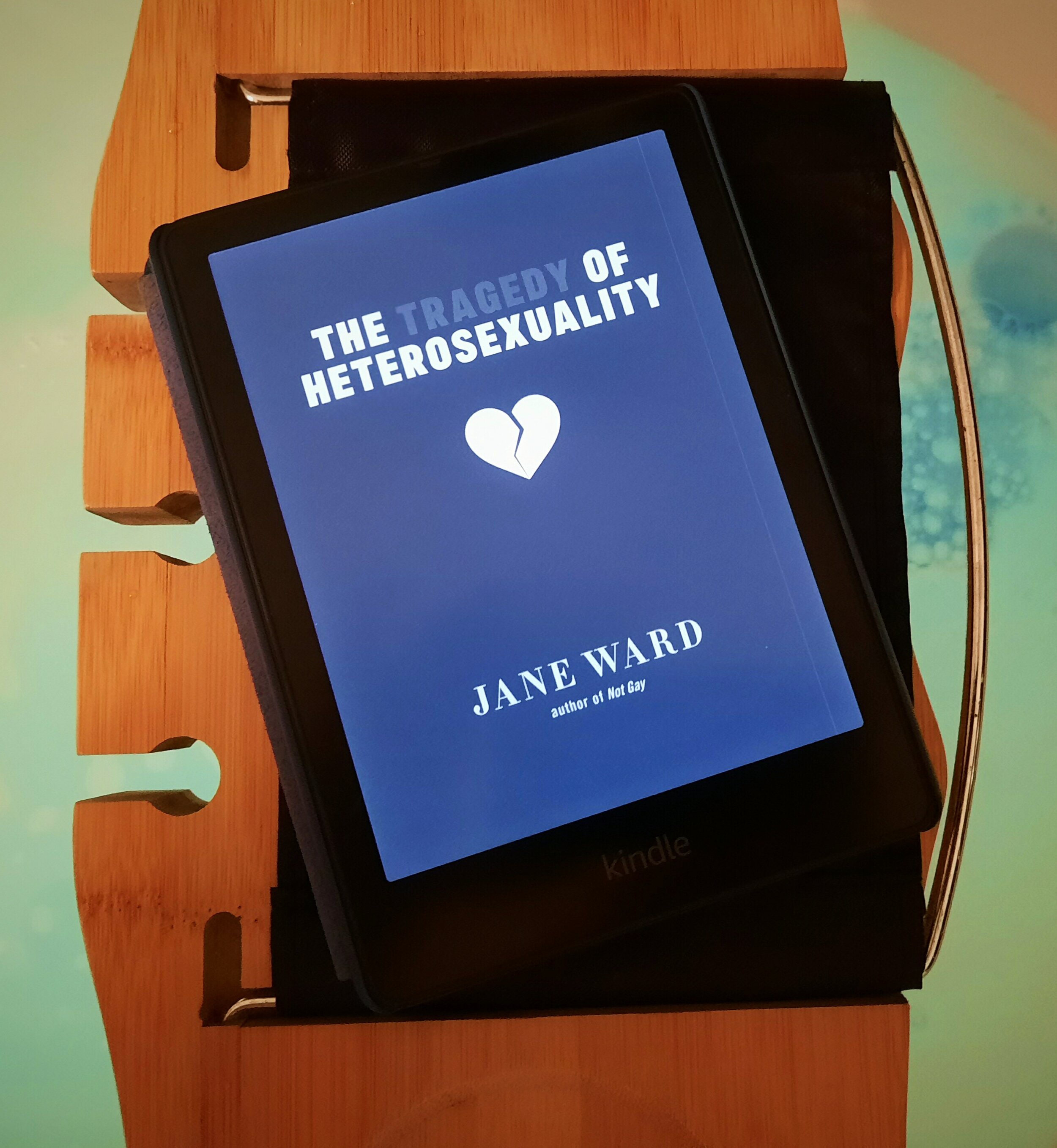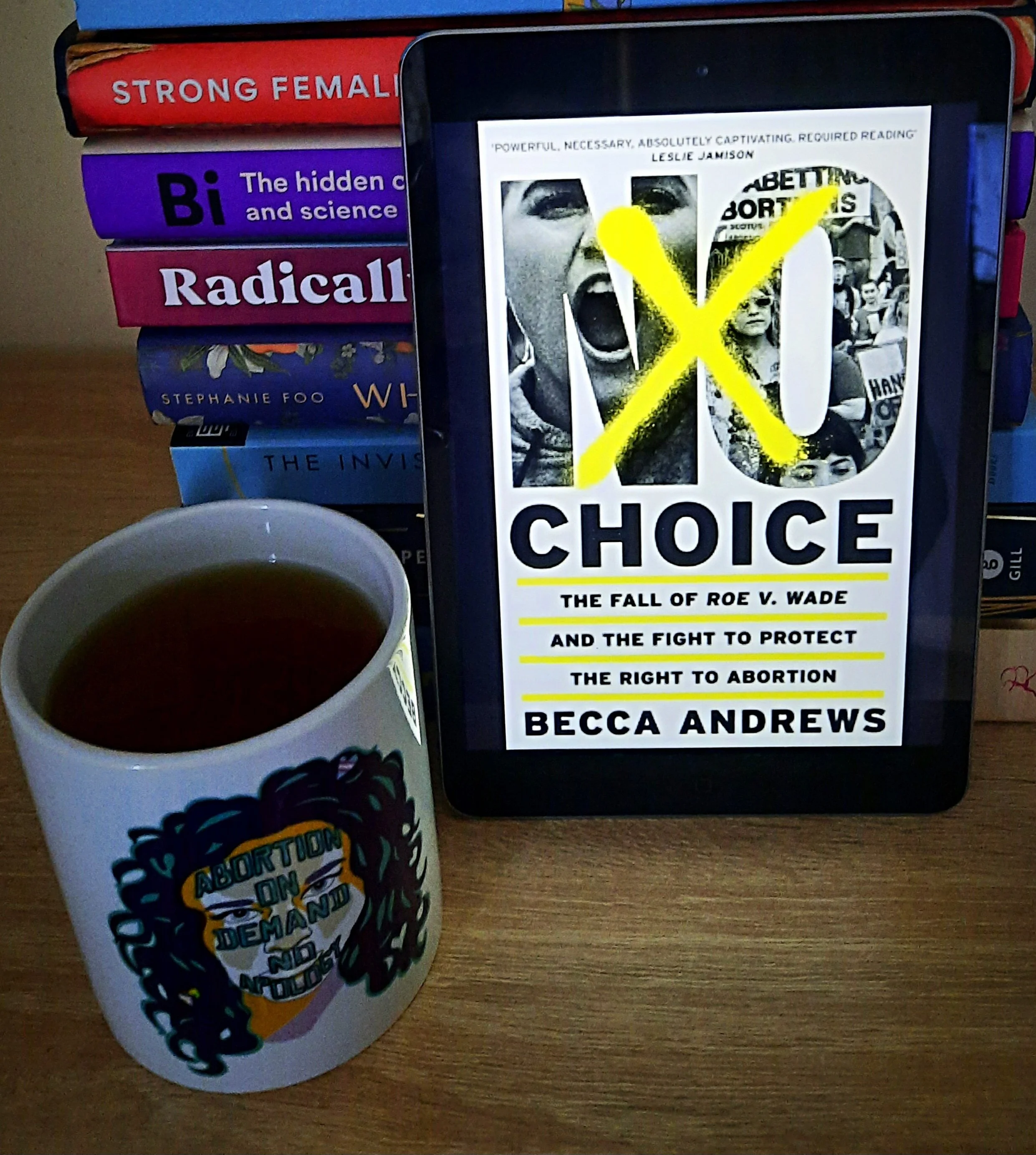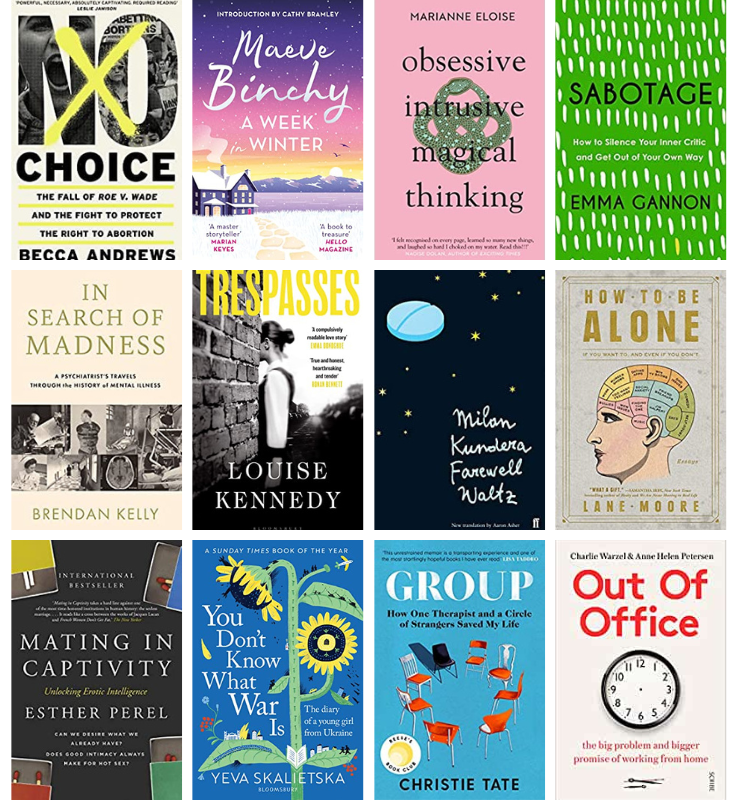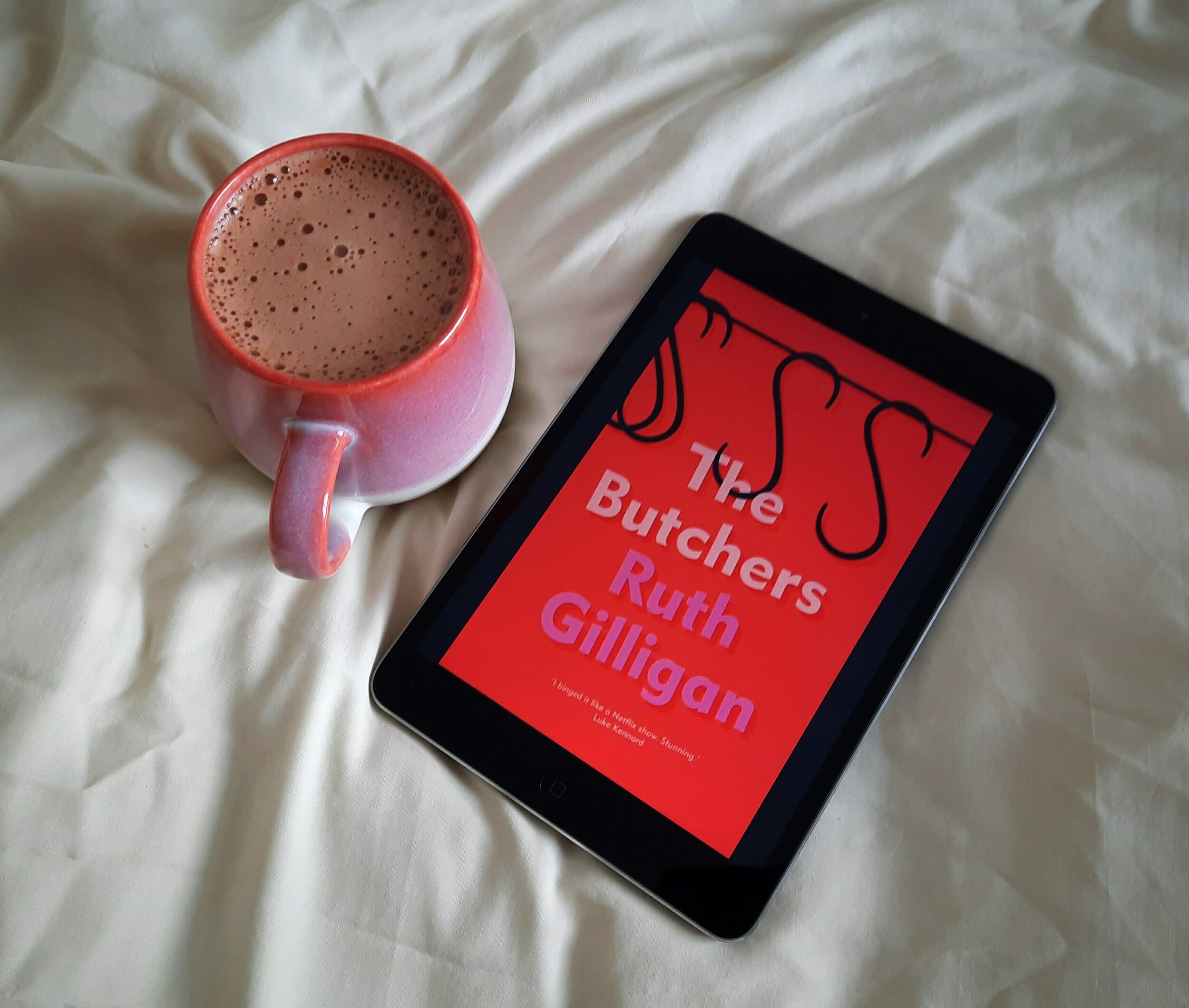Throughout the pandemic, I have been in one of two modes; capable of reading but unable to write coherent reviews or capable of writing reviews but unable to concentrate on reading. The two used to go hand in hand for me, but since early 2020 it’s like those two parts of my brain stopped talking to each other. Given that I enjoy writing about books, this is frustrating. If you follow me on Instagram, you might have noticed that I tend not to post for months and then share multiple book reviews in a row. Instead of my favourite books of the year, I thought I'd take you on a whistle-stop tour of what I’ve read (and abandoned) in 2022. Clare Egan’s 2021 list inspired this yearly round-up.
I began the year the same way I begin most, trying and failing to clear my to-read shelf on Netgalley. Hopefully, 2023 will finally be the year I get my feedback ratio above 80%!
Dear Reader by Cathy Rentzenbrink* is an ode to the power, joy, and comfort of reading written with a warmth and humour that makes it feel like you are simply chatting to Cathy over coffee about books.
If anyone else wrote The Fell* I wouldn’t have picked it up, but Sarah Moss is one of my favourite authors, so I was intrigued to see how she’d handle a pandemic novel. It is a thought-provoking portrayal of the impact of the lockdowns and explores why people made the decisions they did. I loved it.
I read Idol by Louise O’Neill* in two sittings with my heart in my mouth as we witness Samantha Miller’s life publicly unravel. The dynamic between Samantha and Lisa, both as teenagers and in the novel’s present, is frustrating due to O’Neill’s lack of engagement with how the central incident would be viewed or experienced through an LGBTQIA+ lens. The whole thing felt like a plot device dismissive of lesbian, bisexual, pansexual, and other m-spec (multi-spectrum or multiple-attraction spectrum) women’s experiences of sexual violence.
Claire Keegan’s Small Things Like These* is set in New Ross in 1985, so it’s safe to say that most people in or from Ireland will immediately know where the plot is headed. Keegan is a talented writer who excels at describing the quiet moments of everyday life, but the ending didn’t have as profound an impact on me as it has had on others.
Set during the first lockdown in Ireland, 56 Days by Catherine Ryan Howard* is a novel full of secrets. We know from the blurb that Gardaí find a decomposing body, but figuring out who the victim is and what happened isn’t going to be easy. I wasn’t a fan of this one, but it is difficult to discuss why without giving too much away.
Breaking Point by Edel Coffey* is another one that’s difficult to talk about without spoiling the plot, but I’d describe it as a tense novel that isn’t quite a psychological thriller, but that’s the closest to a genre I can place it in. From the blurb, we know Dr Susannah Rice’s baby daughter dies following a tragic accident. An accident which sees Dr Sue charged with negligence. There were parts of this I liked. Other parts, including the ending, not so much. That said, I am looking forward to seeing what Edel Coffey publishes next.
Bisexual Men Exist: A Handbook for Bisexual, Pansexual and M-Spec Men by Vaneet Mehta* looks at the issues that bi, pan, and m-spec men face. It is a well-researched dismantling of misconceptions about bisexuality and a celebration of m-spec identities. I read an advance copy, it’s out in January from Jessica Kingsley Publishers.
The Trauma Beat: A Case for Re-Thinking the Business of Bad News by Tamara Cherry* is an eye-opening examination of the trauma caused by media coverage of crimes to victims, their families, and the journalists involved. Cherry is a former crime reporter, so The Trauma Beat* blends her experiences with research she has carried out since leaving journalism. I read an advance copy, it’s out in May from ECW Press.
Saying I enjoyed memoirs about grief sounds strange, but The Light Streamed Beneath It by Shawn Hitchins* and Totally Fine (And Other Lies I’ve Told Myself) by Tiffany Philippou* both captured the messiness of grief in ways that resonated with me.
Rounding out my Netgalley reads are The Last Days by Ali Millar*, The Crane Wife: A Memoir in Essays by CJ Hauser* and The Transgender Issue by Shon Faye*. I’m planning longer reviews for these, but The Last Days* is a visceral memoir about Ali Millar’s life as a Jehovah’s Witness and her decision to leave. The Crane Wife* was a hit-and-miss read, but this collection has some great essays. In The Transgender Issue*, Shon Faye makes the case for trans liberation by deconstructing the arguments that deny trans and non-binary bodily autonomy. It’s a must-read.
I abandoned a handful of books. Some I will return to; I just wasn’t in the right headspace. Others I have no intention of ever picking up again.
Acts of Desperation by Megan Nolan; I love Megan Nolan’s writing style, so I’ll come back to this one.
What It Feels Like For A Girl by Paris Lees; My Covid-addled brain struggled with the dialect in this. Now that the brain fog has lifted, it’s on my list for 2023.
The Vanishing Triangle: The Murdered Women Ireland Forgot by Claire McGowan; I was so frustrated by this book that I threw my Kindle down forcefully on the couch, which is the modern equivalent of flinging a book across the room. I won’t be giving this a second chance.
How To Do The Work by Dr Nicole LePera; The only good thing I have to say is that I am glad I got it from the library instead of buying it.
I have a complicated relationship with audiobooks. No matter how hard I try, I cannot listen to fiction. Unless it is something I’ve already read multiple times, my brain refuses to retain fictional storylines consumed this way. I’m okay with non-fiction audiobooks, though. I’m guessing because my brain thinks of them as really long podcasts.
Diagnosis: Solving the Most Baffling Medical Mysteries by Lisa Sanders, M.D. is a fascinating collection of patient experiences from Dr Sanders’ New York Times column as they search for diagnoses and treatment for their outside of the ‘norm’ symptoms.
Cultish: The Language of Fanaticism by Amanda Montell tells us that the language of cults is no longer solely used by cults. An enjoyable listen that will raise your blood pressure more than once, given how common this cultish behaviour has become.
Elizabeth Gilbert’s Big Magic: How to Live a Creative Life, and Let Go of Your Fear is one of my go-to books when I’m feeling ‘meh’ with life. That Gilbert reads the audiobook herself made it extra comforting.
The central question of The Psychopath Test by Jon Ronson is, ‘What if everything we know about madness is wrong?’ While the answer isn’t easy, Ronson takes us on a compelling search.
I wish Dr Julia Shaw’s Bi: The Hidden Culture, History and Science of Bisexuality was around when I was questioning my sexuality during my 20s. Using her expertise as a psychological scientist and her experience as a bisexual woman Dr Shaw encourages us to think more broadly about sexuality and informs (or reminds) us that bisexual, pansexual, and other m-spec people have always existed.
When It Is Darkest: Why People Die by Suicide and What We Can Do to Prevent It by Rory O'Connor wasn’t an easy listen subject-wise, but I’m glad I stuck with it.
There is a sentence in the introduction to Barry Cummins’ Missing: The Unsolved Cases of Ireland's Vanished Women and Children that I still think about months later, ‘Either a serial killer is responsible for many unsolved abductions and murders in Ireland, or a number of killers, who have so far evaded justice, could strike again.’
I’m sorry it took me so long to move Don’t Touch My Hair by Emma Dabiri to the top of my to-be-read list. It’s an engaging examination of race, racism, colonialism, black oppression, the fetishisation of black women, and the struggle for black liberation told through the lens of black hair.
I read a few books that were fine, but I wouldn't be in a hurry to recommend them. If you have absolutely nothing to read, then go ahead. Otherwise, focus on your to-be-read pile!
Like a lot of people, I spent much of the year recovering from Covid-19 (twice!) and the many viral and bacterial infections that settled on my chest, so I’ve grouped the books I read while sick.
Jamie Varon’s Radically Content: Being Satisfied in an Endlessly Dissatisfied World felt like a much-needed pep talk from a friend. It is part memoir and part critique of the social conditioning that leads us, as a society, to always strive for the next milestone. Similarly, (Dis)Connected: How to Stay Human in an Online World by Emma Gannon was a pep-talk about changing how you think and live online. The TL;DR is that you don’t need to throw your phone in the sea, but we can all be more intentional about how we use social media.
Pacemaker by David Toms is a beautifully written memoir about chronic illness, walking, and how to live life while considering your body’s limitations. The prose is intimate, precise, and poetic. I underlined so many sentences and paragraphs that I might as well have highlighted the entire book!
Recovery: The Lost Art of Convalescence by Dr Gavin Francis is a meditation on recovery and convalescence that is an easy but informative read full of empathy, wisdom, and hope.
Jessica DeFino recommended Clean: The New Science of Skin and the Beauty of Doing Less by James Hamblin. It’ll make you think differently about how many beauty products you purchase, and I learned a lot about the increasing research into the skin’s microbiome.
Cookbook memoirs are a genre I didn’t know I needed until Sophie White’s Recipes for a Nervous Breakdown and Ella Risbridger’s Midnight Chicken (& Other Recipes Worth Living For) kept me sane while I was stuck in my bedroom during my second bout of Covid. P and I were both sick the first time, so I didn’t get the complete stay one-room experience until the second time. I didn’t cope well with it at all.
Next, we have three books about sobriety.
Sunshine Warm Sober is the follow-up to Catherine Gray's The Unexpected Joy of Being Sober. Gray discusses life as she approaches a decade of being alcohol-free with the same honesty, grace, and humour as her debut memoir. It was interesting to see Gray share the things she would have done differently with The Unexpected Joy of Being Sober and how she thinks about alcohol, the alcohol industry and its hold on society has evolved.
In Not Drinking Tonight: A Guide to Creating a Sober Life You Love, therapist and 'retired party girl' Amanda White provides judgement-free advice on rethinking your relationship with alcohol. Not Drinking Tonight is centred around composite characters based on White's experiences with her therapy clients. I didn't get on with the format, but I can see it being valuable to people who are sober curious or early in their sobriety.
Sarah Manguso’s work was mentioned during a writing workshop I took in February, which I am grateful for because she soon joined my favourite authors' list. 300 Arguments is a collection of fragmented prose and poetry aphorisms. The Two Kinds of Decay is a stunning memoir about the autoimmune disease Manguso developed during her 20s and what it means to be chronically ill.
Speaking of chronic illnesses, I read The Invisible Kingdom: Reimagining Chronic Illness by Meghan O'Rourke and What My Bones Know: A Memoir of Healing from Complex Trauma by Stephanie Foo and was deeply moved by both of them. They both blend memoir with research and are welcome additions to the growing—and much-needed—body of work about what it means to be disabled or chronically ill.
I’m calling this section non-fiction books that don’t fit anywhere else, so I’ve put them on this list!
Five Minute Therapy by psychotherapist Sarah Crosby is a gentle breakdown of attachment, boundaries, self-talk, triggers, and reparenting that provides a solid grounding in how each can affect our mental health.
I was familiar with the CSI effect, where jurors expect forensic evidence in every case, but I was shocked to discover just how much forensic science is anything but scientific. In Junk Science and the American Criminal Justice System, M. Chris Fabricant takes through the many failings of the US criminal justice system, including its reliance on forensic science and ‘expert witnesses’, and his work as an attorney with the Innocence Project to exonerate people who were wrongly convicted.
Are Prisons Obsolete? by Angela Y. Davis is an excellent introduction to the case for prison abolition. Many of the online resources I found assumed people already understood prison abolition, which isn’t the case here, which I appreciated.
Bodies on the Line: At the Front Lines of the Fight to Protect Abortion in America by Lauren Rankin charts the fight for abortion rights in America through the eyes of abortion clinic escorts, abortion clinic defenders, and grassroots activists and organisers. Bodies on the Line is a powerful tribute to the ordinary everyday people who continuously show up to ensure people access abortion care without facing intimidation from anti-abortion protesters.
We Will Not Cancel Us by adrienne maree brown is a critique of cancel culture from a ‘Black, queer, and feminist viewpoint’ (I’ve taken this from the blurb because it sums it up better than I could) that centres transformative justice. I want to press a copy into the hands of every activist and organiser I know.
The Best American Essays is one of my favourite anthologies, and the 2022 edition, guest edited by Alexander Chee didn’t disappoint.
Mar Grace writes the Monday Monday newsletter, which I look forward to reading each week so, naturally, I bought their books. How to Not Always Be Working: A Toolkit for Creativity and Radical Self-Care is part workbook and part advice manual. It wasn’t the right fit for me, purely because of how my life is structured, but I can see myself returning to some of the exercises in the future. On the other hand, Getting to Center: Pathways to Finding Yourself Within the Great Unknown is one of those books that came along at the perfect time and rearranged my brain in the best possible way.
My love affair with memoirs and essay collections continues. I’ve individual reviews of these planned, but I include them here so it doesn’t look like I read 13+ plus books in January.
Bluets by Maggie Nelson
The Instant by Amy Liptrot
White Magic by Elissa Washuta
Negative Space by Cristín Leach
Unsettled by Rosaleen McDonagh
Heretic: A Memoir by Jeanna Kadlec
Rust Belt Femme by Raechel Anne Jolie
All this happened, more or less by Jayne A. Quan
The Madness: a memoir of war, fear and PTSD by Fergal Keane
Foreverland: On the Divine Tedium of Marriage by Heather Haverilesky
Belabored: A Vindication of the Rights of Pregnant Women by Lyz Lenz
Body Work: The Radical Power of Personal Narrative by Melissa Febos
I Hope We Choose Love: A Trans Girl's Notes from the End of the World by Kai Cheng Thom
December saw me reading Christmas-themed books for the first time in years, thanks to the Maeve Binchy Book Club and the Tired Mammy Book Club on Instagram. This Year it Will be Different by Maeve Binchy was a short story collection with very little Christmas cheer and loads of Christmas misery. Catherine Walsh’s Holiday Romance was a fun, cosy, festive friends-to-lovers story full of Irish humour and wit that would make a good film.
I re-read two books, Beautiful World, Where Are You by Sally Rooney and Corpsing: My Body & Other Horror Shows by Sophie White.
Beautiful World, Where Are You was as much a delight on re-reading as it was the first time.
The essays in Corpsing will get under your skin in the way that only Sophie White’s writing can. Her writing is evocative, guttural, and unflinching. It’s one of the best essay collections I’ve read.
I read 63 books, which surprised me, given the time I spent unable to concentrate due to Covid-19 related fatigue and brain fog. My reading is usually more evenly split between fiction and non-fiction, but non-fiction was more dominant last year. I’m looking forward to reading more novels.



















